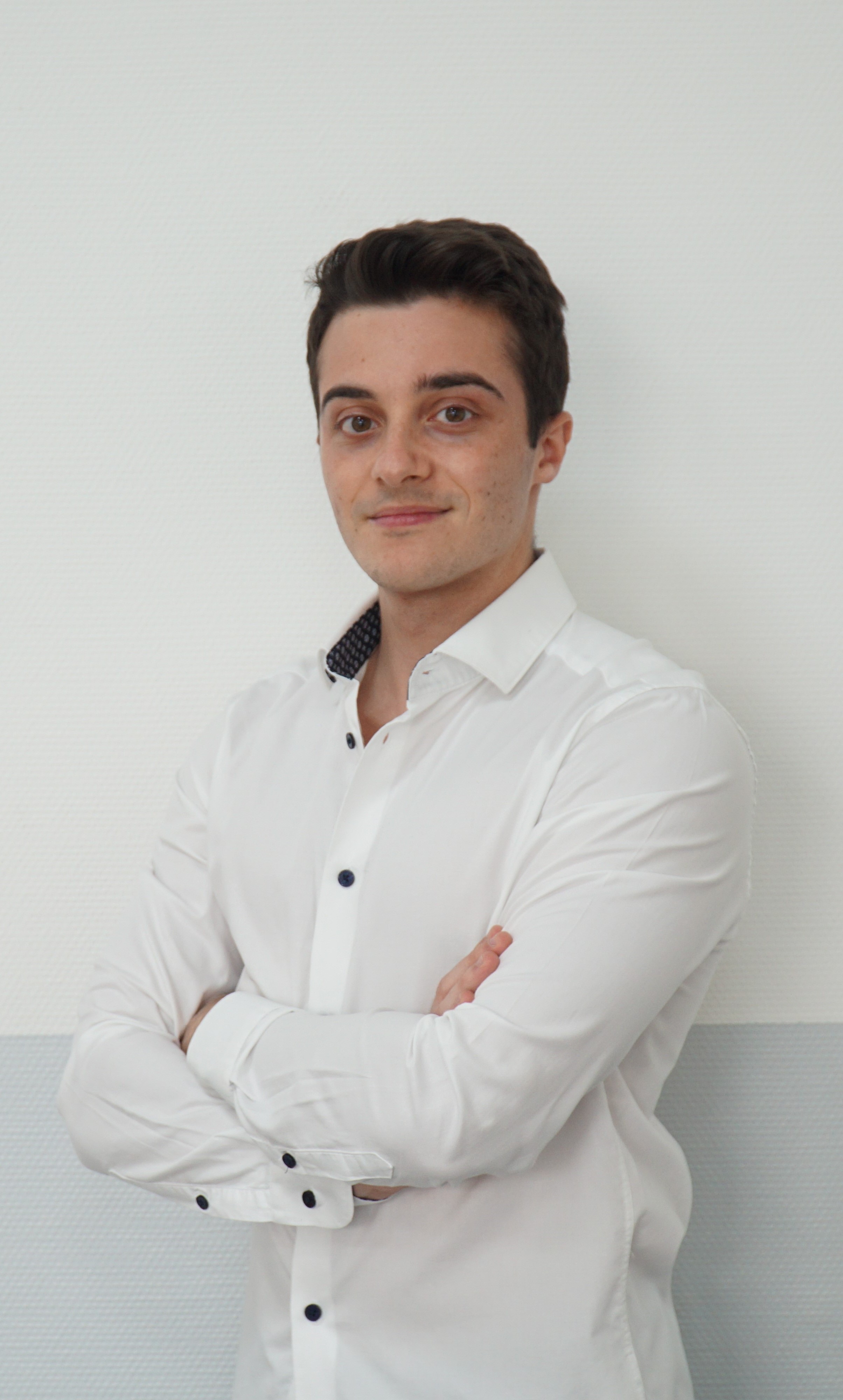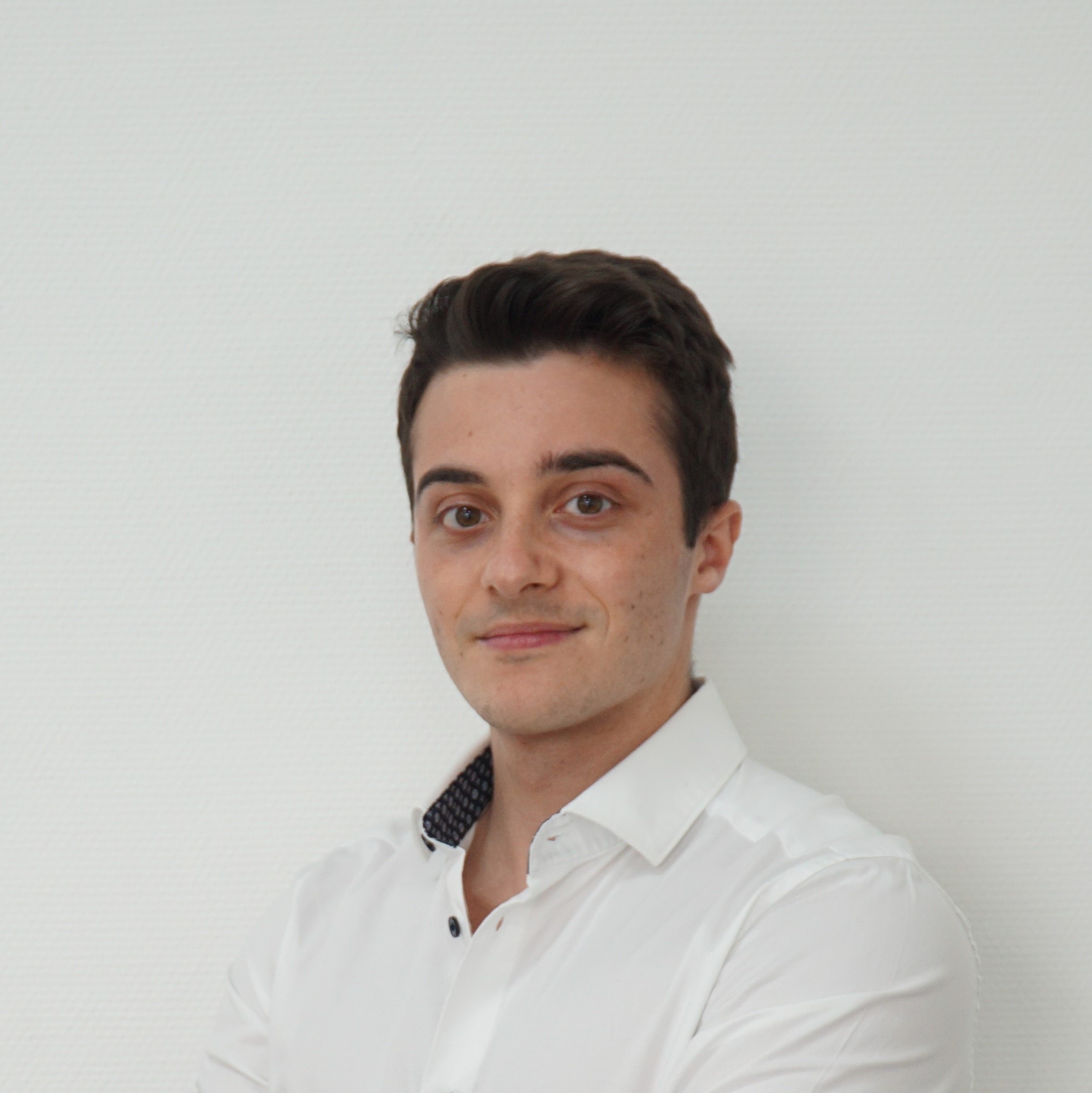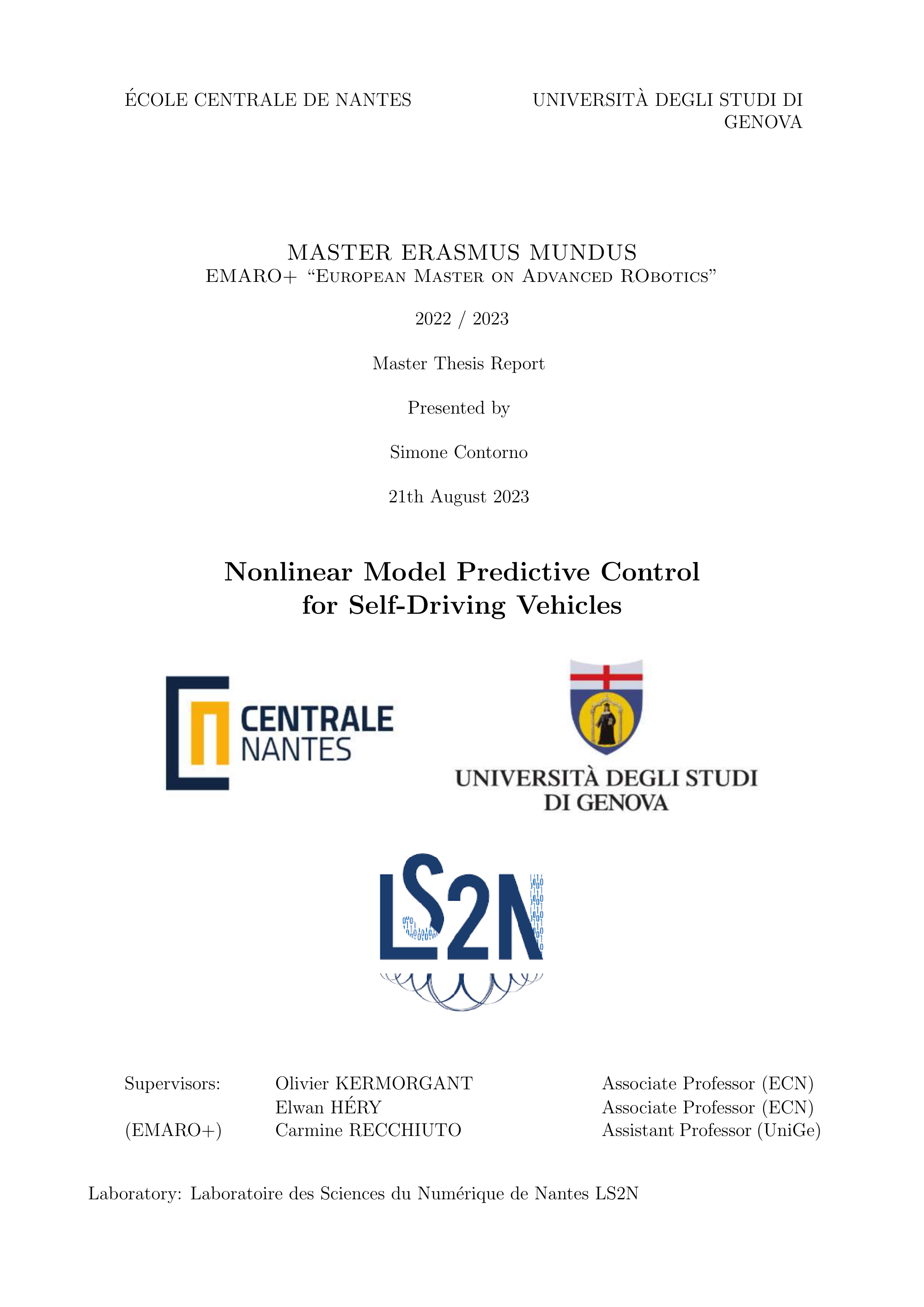
Simone Contorno
I'm a
About
Always looking for excellent opportunities.

Robotics Engineer
🤖 Ambitious and driven Robotics Engineer with a solid foundation in Computer Engineering.
🎓 In 2021, I graduated with a Bachelor's degree in Computer Engineering and embarked on my Master's in Robotics Engineering at the University of Genoa.
🌍 In 2022, I was honoured to join the prestigious EMARO+ double degree program, leading me to pursue my studies in Advanced Robotics at the École Centrale de Nantes in France.
📚 In August 2023, I completed my thesis on "Nonlinear Model Predictive Control for Self-Driving Vehicles", applying my research directly to a Renault Zoe car.
💼 In November 2023, I started my career working as a Software Test and Integration Engineer in Ingolstadt, Germany, working on Premium OEM automotive projects. This role allows me to gain hands-on experience with software validation, automation, and integration in complex international environments.
🧪 In October 2024, I earned the ISTQB Certified Tester Foundation Level certification, strengthening my skills in software testing as part of my current role.
🎯 In July 2025, I completed the professional training program by IBM on Coursera to earn the IBM "AI Engineering" Professional Certificate and the IBM "Generative AI Engineering with LLMs"
Specialization, which includes 13 comprehensive courses covering Machine Learning (ML), Deep Learning (DL), Generative AI (Gen AI), and key tools such as Python, Keras, TensorFlow, PyTorch,
and Scikit-Learn.
🚀 As of July 2025, I’m working as a Robotics Software Engineer in Augsburg, Germany, contributing to the development of robotic USV platforms through embedded and high-level software development, hardware integration within ROS2, and close collaboration with electronics and mechatronics team.
🔧 Outside work, I apply my knowledge through personal projects, focusing on Robotics & AI applications — many of which are available on GitHub (https://github.com/simone-contorno).
🔝 Always eager to learn, innovate, and contribute to advancements in Robotics & AI, I aim to contribute to intelligent and innovative systems!
- Birthday: 25 March 2000
- City: Ingolstadt, Germany
Stats
Work Experience Years
Degrees Academic Qualifications
Certifications Professional Credentials
GitHub Repositories Public Projects
Skills
Skills are rated on a scale from 1 to 4, where: 1: Beginner, 2: Intermediate, 3: Advanced, 4: Expert.
Technical Skills
Specialized Areas
Soft Skills
Professional Experience
Robotics Software Engineer
07.2025 - Present
Lemvos GmbH - Augsburg, Germany
- Development and maintenance of embedded and high-level software for robotic USV platforms.
- Integration of hardware drivers and sensors in ROS2-based systems.
- Design and implementation of control, navigation, and inter-module communication pipelines.
- Close collaboration with the electronics and mechatronics team for full-stack system integration.
- Simulation testing and validation through field trials (including lake and sea trials).
Software Test & Integration Engineer - Automotive (Premium OEM Projects)
11.2023 - 07.2025
Enginium S.r.l. - Ingolstadt, Germany
- Automated 75% of ECU test cases by developing Python wrappers and scripting macros, significantly increasing test coverage and improving overall team efficiency.
- Executed black-box diagnosis testing of control units in real vehicles, applying checklist-based protocols and trace analysis.
- Participated in Agile-based test planning using Jira, supporting sprint activities, task tracking, and coordination within a 30+ member international team.
- Mentored junior team members in test tool usage and trace analysis.
Robotics Engineer Intern. - Self-Driving Vehicles (Research)
02.2023 - 08.2023
Laboratoire des Sciences du Numérique de Nantes (LS2N) - Nantes, France
- Designed and implemented a Nonlinear Model Predictive Controller (NMPC) in C++ using ROS2, achieving real-time performance with sub-20 ms control cycle times on autonomous vehicle platforms.
- Performed system integration, debugging, and code reviews for robotic and automotive platforms.
- Integrated NMPC on ROSbot 2R and Renault Zoe, ensuring compatibility across sensors, control modules, and simulation environments.
Education
M.Sc in Advanced Robotics
09.2022 - 08.2023
Master's degree - University of Nantes, France
- Developed a thesis project on Nonlinear Model Predictive Control (NMPC) for autonomous vehicles, implementing real-time control algorithms in C++ and Python within the ROS2 framework on Linux, focusing on trajectory planning and simulation.
- Completed hands-on laboratories using C++ and Python in ROS/ROS2.
- Acquiring strong foundations in robotics, control theory, and simulation, emphasizing algorithm implementation, sensor integration, and testing in virtual environments.
M.Eng in Robotics Engineering
09.2021 - 06.2022
Master's degree - University of Genoa, Italy
- Specialized in robotics software development in ROS, using C++ and Python.
- Explored robotics control systems using MATLAB and Simulink.
- Studied fundamentals of Manipulator Control, Machine Learning, Mobile Robots, and Artificial Intelligence (AI).
B.Eng in Computer Engineering
09.2018 - 06.2021
Bachelor's degree - University of Genoa, Italy
- Developed a thesis on runtime monitoring of YARP (Yet Another Robot Platform) modules, implementing monitoring logic and diagnostics in C++ on Linux-based systems.
- Gaining solid experience in software development using C++ and Java, applying object-oriented principles across academic and project-based contexts.
- Explored simulated control systems using MATLAB and Simulink, analysing dynamic behaviour and validating control algorithms in virtual environment.
Certifications
AI Engineering Professional Certificate & Generative AI Engineering with LLMs Specialization
01.2025 - 07.2025
IBM
- Practical experience with supervised and unsupervised learning, model evaluation, and deployment using Python, Scikit-learn, PyTorch, Keras, and TensorFlow.
- Understanding of LLM architectures, fine-tuning techniques, and transformer-based pipelines for NLP applications.
- Hands-on development of AI agents using RAG, LangChain, and Hugging Face tools.
Certified Tester Foundation Level
10.2024
ISTQB
- Understanding of software testing principles, test planning, and test execution processes.
- Overview of test design methods, such as boundary value analysis and equivalence partitioning.
- Knowledge of defect identification, reporting, and lifecycle management, ensuring high-quality software outputs.
Languages
Languages are rated on a scale from 1 to 4, where: 1: Basic (A1/A2), 2: Independent (B1/B2), 3: Proficient (C1/C2), 4: Native.







